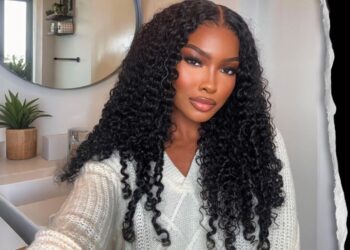In the realm of hair care, the pursuit of luscious, healthy hair has led to a myriad of products and treatments. One such innovation that has gained prominence in recent years is hair serums. These lightweight, versatile formulations have garnered attention for their ability to provide intense moisture and repair to the hair. From frizz control to split-end mending, hair serums have become a staple in many individuals’ hair care routines.
Understanding Hair Serums
Hair serums are specially formulated liquids designed to target specific hair concerns. Unlike traditional hair oils or leave-in conditioners, serums are lightweight and non-greasy, making them suitable for all hair types. They are designed to provide concentrated doses of nourishing ingredients directly to the hair strands, addressing issues such as dryness, frizz, damage, and lack of shine. Serum for hair typically contain a blend of active ingredients, such as vitamins, oils, proteins, and silicones, which work together to improve hair texture and appearance.
Benefits of Hair Serums
Hair serums offer a multitude of benefits that contribute to the overall health and appearance of the hair. Here are some key advantages:
- Intense Moisture: One of the primary functions of hair serums is to deliver moisture to the hair shaft, combating dryness and brittleness. This is particularly beneficial for individuals with naturally dry or chemically treated hair.
- Frizz Control: Frizz is a common concern for many, especially in humid environments. Hair serums create a protective barrier on the hair’s surface, sealing the cuticle and preventing moisture from entering the hair shaft, thus reducing frizz and flyaways.
- Heat Protection: Hair serums often contain ingredients that offer heat protection, guarding the hair against damage caused by styling tools such as blow dryers, flat irons, and curling wands.
- Repair and Strengthen: Many hair serums contain reparative ingredients like keratin, amino acids, and essential oils. These elements help to repair split ends and strengthen the hair strands, preventing further damage.
- Enhanced Shine: Hair serums can impart a healthy shine to dull or lackluster hair, making it look vibrant and well-maintained.
- Manageability: The lightweight nature of hair serums makes them excellent for taming unruly hair, making it easier to detangle and style.
Key Ingredients in Hair Serums
The efficacy of hair serums lies in their formulation, which typically includes a blend of key ingredients. Here are some common components found in hair serums and their functions:
- Silicones: These ingredients form a protective layer on the hair’s surface, providing a smooth texture and preventing moisture loss. They also contribute to frizz control and increased shine.
- Vitamins: Hair serums often contain vitamins like Biotin (Vitamin B7) and Panthenol (Vitamin B5) that promote hair growth, improve texture, and provide nourishment.
- Oils: Natural oils such as Argan oil, Jojoba oil, and Coconut oil are rich in fatty acids and antioxidants that deeply moisturize the hair, providing softness and shine.
- Proteins: Keratin, a protein found in hair, is often included in serums to strengthen and repair damaged hair strands. Other proteins can help improve elasticity and reduce breakage.
- Amino Acids: These building blocks of proteins aid in repairing damaged hair by filling in gaps and smoothing the hair cuticle.
- Antioxidants: Ingredients like Vitamin E act as antioxidants, protecting the hair from environmental damage and promoting overall hair health.
Application Techniques
To achieve optimal results from hair serums, proper application techniques are essential. Here’s how to effectively apply hair serums:
- Clean Hair: Start with freshly washed and conditioned hair. Excess dirt and oil can hinder the serum’s absorption.
- Damp Hair: Hair serums are most effective when applied to damp, towel-dried hair. The moisture helps distribute the serum evenly and allows for better absorption.
- Amount: The amount of serum used should be adjusted based on hair length and thickness. A pea-sized amount is typically sufficient for short to medium-length hair, while longer or thicker hair may require more.
- Distribution: Rub the serum between your palms and then distribute it evenly through your hair, focusing on the mid-lengths and ends. Avoid applying directly to the roots to prevent a greasy appearance.
- Comb Through: Use a wide-tooth comb or your fingers to comb through the hair to ensure even distribution.
- Avoid Overuse: Using too much serum can weigh down the hair and make it appear greasy. Start with a small amount and add more if needed.
- Style as Desired: After applying the serum, you can proceed to style your hair as usual. The serum will provide a protective layer and enhance the final look.
Hair Serum Contributing to Overall Hair Health
Hair serums play a vital role in maintaining overall hair health by addressing specific concerns and providing targeted solutions. Regular use of a high-quality hair serum can lead to long-term improvements in hair texture, appearance, and manageability. By keeping the hair adequately moisturized, protected from heat and environmental damage, and nourished with essential vitamins and nutrients, hair serums contribute to the prevention of split ends, breakage, and other common hair issues.
Conclusion
The world of hair care has been revolutionized by the introduction of hair serums. These versatile formulations offer intense moisture and repair, addressing a range of concerns from frizz control to split-end mending. With their carefully crafted blends of ingredients like silicones, oils, proteins, and vitamins, hair serums provide a lightweight yet effective solution for individuals seeking healthier, more vibrant hair. When applied using proper techniques, hair serums can become an indispensable part of a comprehensive hair care routine, contributing to the overall health and beauty of one’s crowning glory.







